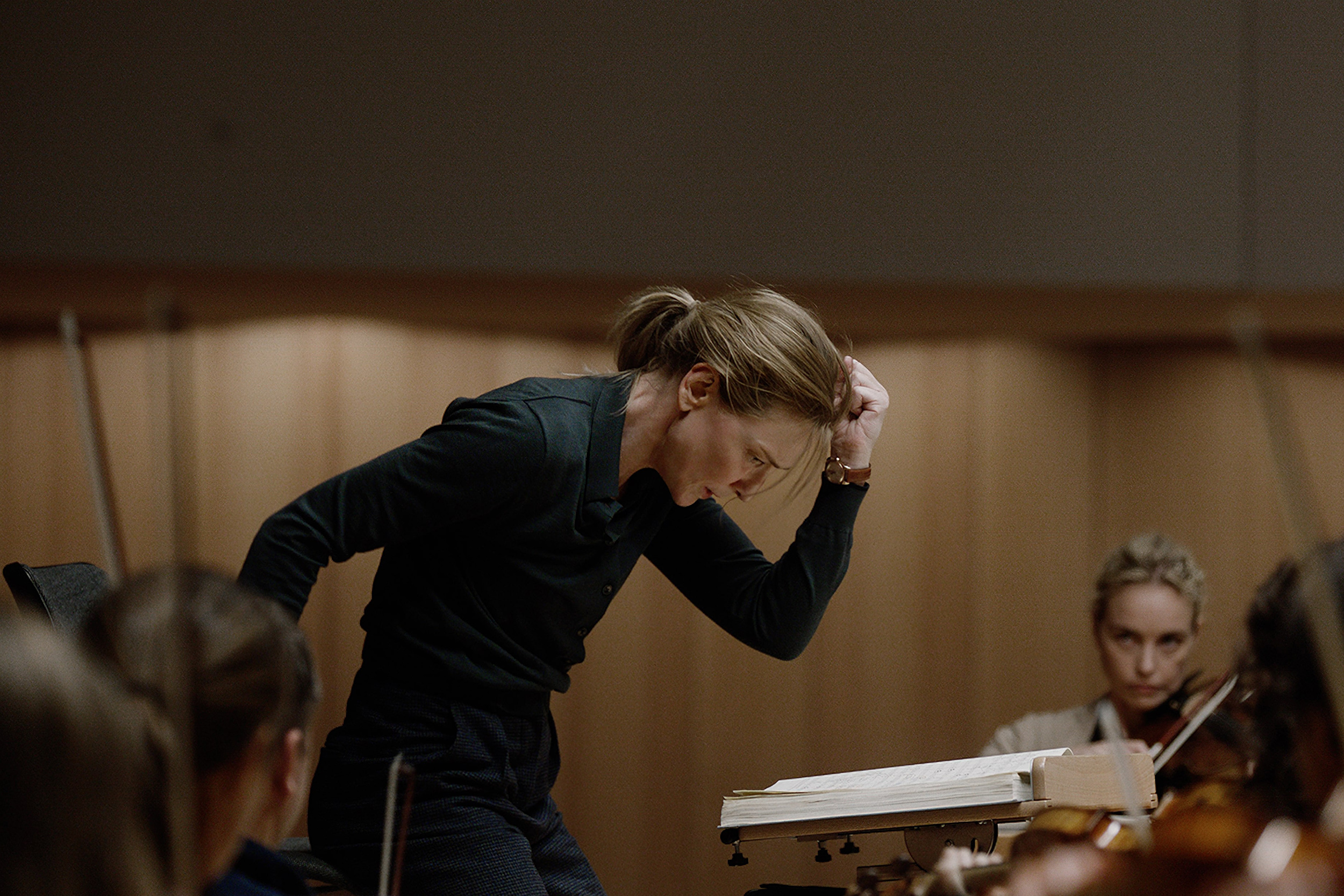Mad genius writ wildly large, Todd Field’s sterling 2022 accomplishment Tár features Cate Blanchett in the most intelligent performance committed to screen in many a year, that of a world-renowned orchestra conductor and monument of high art whose unbridled self-possession lands her directly in the crosshairs of cancel culture.
In a film about an uncompromising artist—both objectively brilliant at her craft and wickedly unscrupulous in her private life—Field presents a complicated anti-heroine as both a gifted, fiercely commendable musical artiste and a fallen genius, a portrait of a Mahler scholar by way of scheming power broker seductress. It’s a character study that skewers the current moment—here the revocation of public figures deemed guilty in the court of public opinion (though in this case, we learn, guilt is likely on order).
There is no contemporary actor or actress working today with the fierce perceptiveness and gravitas that Blanchett brings to everything she graces. Her performance as Lydia Tár, one of the grandest egoists ever to grace the world of classical music—an internationally revered, EGOT-winning, musical director “maestra” who deems herself untouchable at the podium, her Mount Olympus, from which she will spectacularly fall—is breathtaking in the extreme.
We first meet extraordinary Tár as she’s being interviewed by The New Yorker’s Adam Gopnik before a rapt Manhattan audience, her storied career achievements consecutively ticked off, each more impressive. While Blanchett hooks us here from the get-go, inviting us into her genius, Tár herself remains an enigma.
High profile, high living Tár globetrots between New York and Berlin, where she resides in a flat with her female partner, Sharon, played in a casting masterstroke by the terrific German star Nina Hoss (Barbara), whose naturalistic warmth as an actress is antithetical to Blanchett’s cruise missile, studied preparation; this sublime juxtaposition beautifully serves their onscreen pairing.
Sharon is also a lead violinist in the Berlin orchestra (in reality the Dresden Philharmonic) for which Tár serves as artistic director. With oppositional temperaments, the pair’s publicly creative identity and domestic house play, co-parenting Sharon’s grade school daughter, are presented as two different worlds, each of which Tár unmistakably rules. Theirs is an efficiently written union—dominant master and woman behind the woman.
Also integral to Tár’s demands is assistant and music director hopeful Francesca, well played by The Portrait of a Lady on Fire’s French star Noemi Merlant (Field has done his homework and assembled a top-flight cadre of international thespians). Francesca keeps everything running between tony hotel suites, musical halls, press interviews and, it turns out, running interference between Tár and an increasingly desperate, once artistically promising former female protégé and probable lover whom Tár has personally discarded and professionally blackballed. The cast off is now little more than a ghost, and one prepared to haunt with chilly force.
Into Tár’s orchestral ecosystem comes a brilliant young Russian cellist named Olga (British cellist Sophie Kauer), immediately piquing Tár’s dual interests, both musically and perhaps sensually. This budding power play seduction is not lost on Sharon, observing the pair’s coy exchanges over rehearsals of Mahler’s Symphony 5. And this we come to understand as Tár’s modus operandi—using star power to draw brilliant new female discoveries into her personal orbit before callously moving on, a string of broken hearts, and artists, in her wake. In hubris, Tár believes herself untouchable; too big to fail. Anyone following today’s headlines well knows this to be an epic misjudgment.
There is much more, including a second-tier, hopeful conductor played by Mark Strong, intriguing friendship with a former mentor (Julian Glover in two terrific scenes) and a shock suicide complete with a sordid email trail followed by a swift media and social indictment (including a wry barb at The New York Post).
Bearing mention and early in the picture, Field gives Tár what may be the movie scene of the year, a scathing takedown of Millennial and Gen Z identity politics playing fast, loose and dismissive with musical history’s virtuosos. Over a Juilliard class lecture, a student (Zethphan Smith-Gneist) self-identifying as “a BIPOC pangender” brazenly resists consideration of Bach’s legacy, citing the composer a “CIS white male” and “misogynist.” Circling the freshman around the concert hall while constructing a sly, measured, near courtroom defense of the Baroque German master (and really of the unassailability of art itself) while holding that court as if a cheetah preparing to pounce upon a young gazelle, Tár is both clear-eyed prosecutorial of today’s youth and staunch in the defense of art above all, laying waste to the modern religion of identity first, talent second. It’s the best written scene in an American film this year.
To see this level of thought and rigor in Blanchett’s acting—deconstructing classical music history and theory in conversational dissertations on the personal predilections and artistic canons of the greats, from Bach to Beethoven to Mahler, while railing against the present moment of cancel culture in which “robotic” collegiates dismiss history’s greatest works of art based on 21st century social politics is a legitimate thrill. Speaking English and German, Blanchett’s fully invested embodiment illustrates acting as mental clockwork, listening, thinking and evaluating each musical movement and her own next move.
Field has crafted a pic not given to easy decoding and occasionally narratively oblique, always a step ahead. The final act of Tár lands on a sudden, sour note that could not be otherwise, including past revelations and a Thailand-set comedown which will not be revealed here. Yet even as the world demands her cancellation, Field refuses to abandon admiration for Tár’s drive and genius in the midst of reversed fortunes. Yet how does he really feel about her?
Field’s literate, substantial screenplay, building and then dismantling a maverick who has her wings abruptly clipped, presents an intense portrait of a once-in-a-generation, turbulent artist of unequaled gifts. His Lydia Tár is by turns awe inspiring, frightening and mesmeric. She will be punished for her transgressions, all right, but to the film’s credit we are never quite sure if Field feels it a narrative dictate, fitting sanction or merely that reality in today’s world demands it.
For Field (In the Bedroom, Little Children), whose last film was sixteen years ago, Tár is not only a return to writing and directing but one fueled by the sort of vision and command evidenced in each frame of an immediately recognizable masterwork. No doubt sentimentalists will find the picture’s chilly assessment of humankind too “Kubrickian,” cerebral and perhaps detached, but it is important to recognize an American film of such rare ambition and intelligence. At two hours and thirty-eight minutes, I wanted another hour from Tár and its committed star.
4 stars



